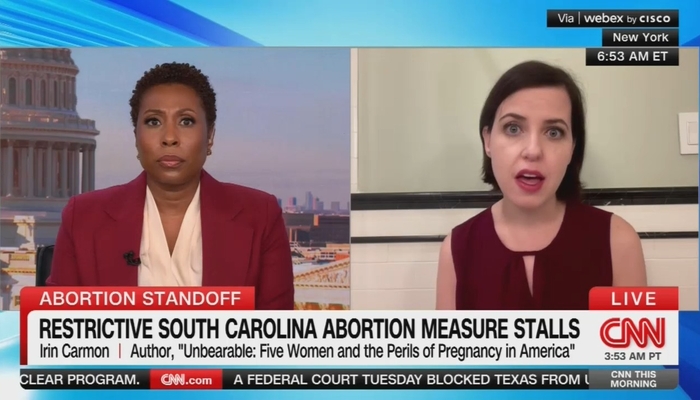
www.newsbusters.org
On CNN, New York Magazine's Irin Carmon Smears Pro-Lifers: ‘Extremist, Politically Toxic’
During Wednesday’s airing of CNN This Morning, host Audie Cornish brought back on New York magazine senior correspondent and CNN contributor Irin Carmon, who called those in favor of total abortion bans as “extremist” and “politically toxic.”
This was in relation to a recent effort in the South Carolina legislature that would have made abortion seekers and providers subject to prison time and given embryos higher legal status, but failed to make it out of committee.
Carmon, who has also worked for the leftist Web sites Jezebel and Salon as well as MSNBC.com, appeared on the morning show several weeks prior and said that many pregnant women lost constitutional rights as a result of the Supreme Court’s ruling in Dobbs v. Jackson.
Cornish set the stakes high when recounting Carmon’s description of the South Carolina bill: “You've called it a natural progression of calling abortion murder, right? Which for anti-abortion advocates, they have looked at laws that treat embryos and even fertilized eggs as Constitutional persons.”
Not to be a pronouns guy, but so-called “anti-abortion” advocates have typically been referred to as “pro-life” supporters out of a sense of mutual respect. Did this mean it’d be okay to refer to those in favor of “pro-choice” policies as “anti-life”?
Carmon latched onto the “fission within the anti-abortion movement” over the next strategic steps, and how South Carolina is going too far:
… to take that ideology of even at the very first moment of fertilization, they would like this blastocyst, embryo, fetus to have the legal status of a person over the person who's carrying it. And what we're actually seeing is the political backlash being very powerful to that extremist view.
Extremist? Most, if not all, pro-lifers have believed pre-born fetuses were “persons” who deserved full or near-full legal protection. There’ve been variances of opinion on certain specifics, but the very foundation of the pro-life stance was that pre-born children should not be aborted. What about the other extreme -- that abortion should be legal in every circumstance? The Left thinks that's eminently sensible, not extreme.
Carmon mentioned some collateral issues related to giving fetuses personhood in the eyes of the law, but then admitted that view, which she just called “extremist,” as consistent with many pro-lifers, but still poisonous:
It's the same view you mentioned, IUDs. It's also the same view that led the Alabama state Supreme Court to ban IVF until there was a legislative fix in the state of Alabama. It's something that many people in the anti-abortion movement believe, quite consistent with their belief […] how they see the world. But it is definitely politically toxic.
There you have it. If you believe unborn children deserve more stringent legal protection, then you are “toxic.”
Carmon’s argument also didn’t square with the fact that even states with looser abortion laws would still take the unborn baby into account instances of violence or injury to the mother, such as murder and accidents.
Despite the fact that the bill didn’t even make it out of committee, Carmon issued a dire warning about the state of abortion post Roe v. Wade: “… the six week abortion ban when fetal activity is first detected, used to be considered the most extreme possible law. That's now in effect in multiple states. So, certainly for now, the so-called abolitionists, the most extreme wing of the anti-abortion movement has been quashed. But they are certainly not going anywhere.”
Cornish would be wise to invite on one of those pro-lifers next time. I’m sure they’d love to be as extreme and toxic as Carmon made them out to be.
The transcript is below. Click "expand" read:
CNN This Morning
November 19, 2025
6:53:34 a.m. EST
AUDIE CORNISH: So, you have said that what's happening in South Carolina, meaning this particular legislation, you've called it a natural progression of calling abortion murder, right? Which for anti-abortion advocates, they have looked at laws that treat embryos and even fertilized eggs as Constitutional persons. So what's significant about how this is playing out?
IRIN CARMON: Well, Audie, there is a fission within the anti-abortion movement about not only how to approach this moment, but really from the moment that Roe V. Wade existed about how to approach their ideology. And what we see in South Carolina is really the vanguard of that debate. Now that the Supreme Court has overturned Roe V. Wade in the past three years, you've had groups vying for what is the best next strategy.
Is it to do what South Carolina has done, which is, again, to take that ideology of even at the very first moment of fertilization, they would like this blastocyst, embryo, fetus to have the legal status of a person over the person who's carrying it. And what we're actually seeing is the political backlash being very powerful to that extremist view. It's the same view you mentioned, IUDs. It's also the same view that led the Alabama state Supreme Court to ban IVF until there was a legislative fix in the state of Alabama. It's something that many people in the anti-abortion movement believe, quite consistent with their belief —
CORNISH: Right.
CARMON: — with their — how they see the world. But it is definitely politically toxic.
One thing I will say is that even though this bill failed out of committee, South Carolina has often been a kind of testing ground for future laws. Definitely worth paying attention to because what they have in place right now, the six week abortion ban when fetal activity is first detected, used to be considered the most extreme possible law. That's now in effect in multiple states. So, certainly for now, the so-called abolitionists, the most extreme wing of the anti-abortion movement has been quashed. But they are certainly not going anywhere.










